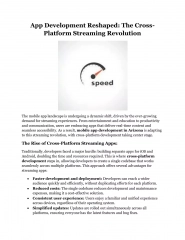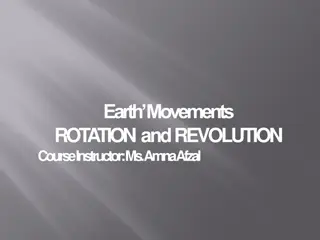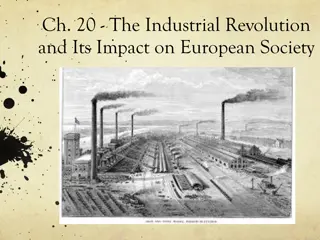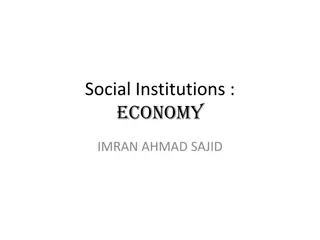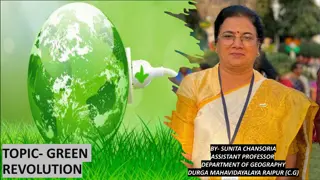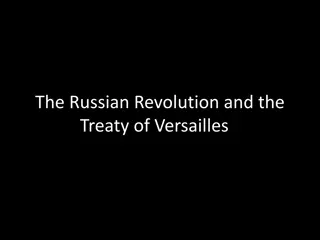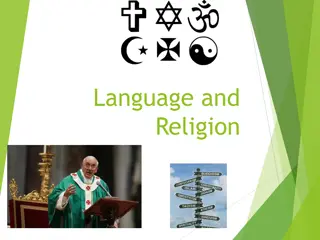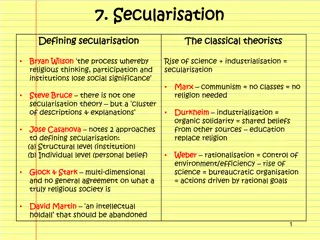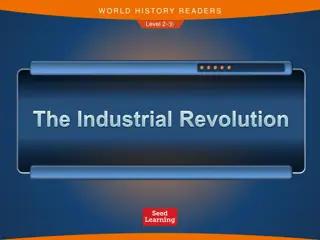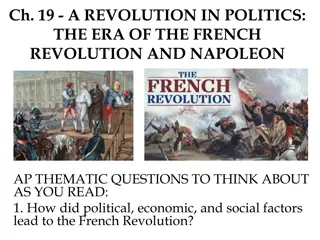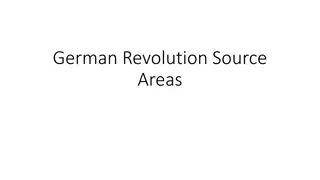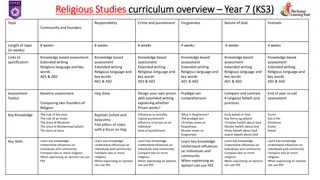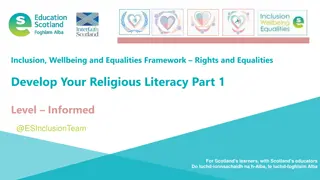Class Group Revolution Adapting to Modern Learning
Embrace the future of education with a Class Group revolution. Discover innovative approaches to modern learning, fostering a dynamic and interactive educational experience. Read full article https:\/\/explainlearning.com\/blog\/class-group-revolution-adapting-to-modern-learning\/
6 views • 2 slides
App Development Reshaped The Cross-Platform Streaming Revolution
The mobile app landscape is undergoing a dynamic shift, driven by the ever-growing demand for streaming experiences. From entertainment and education to productivity and communication, users are embracing apps that deliver real-time content and seamless accessibility. As a result, mobile app develop
1 views • 3 slides
AI in Financial Services: Digital Revolution and Fintech Disruption
The digital transformation in financial services is driven by AI, sparking a social revolution impacting all aspects of life. Industry 4.0 brought FinTech disruption, creating new ecosystems and partnerships for innovative financial solutions. Incumbents and regulators have responded with strategies
1 views • 21 slides
Are You Ready for Eyelash Extensions South Yarra's Beauty Revolution
This blog will delve into the world of eyelash extensions in South Yarra, answering the question: Are you ready for this exciting beauty revolution? We'll explore the benefits, different types of extensions, aftercare tips. Read full article \/\/ibrowandlashesau.medium.com\/are-you-ready-for-eyelas
1 views • 4 slides
Status of Family Laws in India: Hindu vs. Religious Minorities
The family and personal status laws in India vary between Hindu law and those pertaining to religious minorities. While Hindu law has seen extensive reforms, discriminatory provisions still exist. In contrast, laws governing religious minorities have undergone fewer reforms, leading to greater inequ
2 views • 4 slides
The American Revolution: Causes, Events, and Consequences
The American Revolution was sparked by British government control over the colonies and imposition of taxes without representation. Key events such as the Boston Massacre and Boston Tea Party further fueled the revolt. The war ended in victory for America and led to the birth of a new nation. Explor
2 views • 7 slides
Understanding Religious Conflict: Definition and Types Explored
Religious conflict is a complex and recurring concept throughout history. Scholars have defined it as disagreements between religious groups. This conflict arises from contentious issues touching on ideology, morality, power, and identity, influenced by various socio-political, economic, and cultura
1 views • 13 slides
Evolution of Akbar's Religious Policy: A Historical Overview
In the 16th century, Akbar the Great implemented a revolutionary religious policy in the Mughal Empire. Initially a devout Sunni Muslim, Akbar evolved his stance to promote harmony and equality among all religions, fostering tolerance and understanding. This shift marked a significant departure from
0 views • 25 slides
The Impact of Industrial Revolution on Society
The Industrial Revolution, spanning from 1760 to 1870, revolutionized manufacturing processes, transitioning from hand production to machines, introducing new chemical and iron production methods, and the use of steam power. It began in England and caused radical societal changes, leading to the ris
1 views • 34 slides
Understanding Earth's Rotation and Revolution
Explore the concepts of rotation and revolution of the Earth, including how they cause day and night, the Earth's tilt, and the effects on different hemispheres. Engage in a hands-on activity to visually understand these movements. Learn about the Earth's rotation and revolution around the sun and t
1 views • 21 slides
Impact of Industrial Revolution on European Society
The Industrial Revolution had a profound impact on European society, characterized by key terms such as Agricultural Revolution, Capital, Pig Iron, Wrought Iron, Tariffs, Cholera, and Trade Unions. This period saw advancements in agricultural techniques, the rise of material wealth for production, t
1 views • 24 slides
Elizabethan Religious Settlement: Unity Amidst Division
Amid religious division in England, Queen Elizabeth I implemented a Religious Settlement in 1559 to unify the country. The settlement, a blend of Protestant and Catholic elements, aimed to maintain peace and prevent rebellions. Elizabeth's strategic compromise pleased most people, though lingering t
0 views • 14 slides
Understanding Secularism: Principles and Advantages
Secularism is the principle of separating government institutions from religious entities to ensure equal rights for believers and non-believers. It safeguards freedom of religious belief and practice, upholds religious freedom, and promotes democracy and fairness. Secularism aims to prevent religio
0 views • 21 slides
Evolution of Economic Institutions Through Technological Revolutions
Economies of modern nations have evolved over centuries through technological revolutions. The Agricultural Revolution led to the creation of a distinct economy with surplus production, job specialization, and trade. The Industrial Revolution further transformed production, leading to significant in
1 views • 35 slides
Understanding Earth's Rotation and Revolution
Explore the concepts of rotation and revolution as they relate to Earth's movement in space. Learn how rotation results in day and night, and how revolution around the Sun leads to the changing of seasons. Discover the difference between real and apparent motion in celestial bodies.
2 views • 7 slides
The Impact of the Fourth Industrial Revolution on Service Delivery in the Public Service
Public service plays a vital role in society, with the Fourth Industrial Revolution (4IR) bringing significant changes. This revolution, characterized by rapid technological advancements, is reshaping how services are delivered in South Africa and globally. The fusion of digital, biological, and oth
0 views • 19 slides
Green Revolution: Transforming Agriculture for a Sustainable Future
The Green Revolution marked a significant period in global agriculture with the introduction of new technologies like chemical fertilizers, pesticides, and high-yielding seeds. This revolution, attributed to Norman Borlaug, boosted crop productivity, ensured food security, and saved millions from fa
2 views • 11 slides
Understanding Religious Language: Cognitivism vs. Non-Cognitivism in the University Debate
This discussion explores the debate between cognitivism and non-cognitivism in religious language. Cognitivism asserts that religious claims aim to describe the world and can be true or false, while non-cognitivism argues that such claims express attitudes and cannot be verified. Flew's challenge qu
0 views • 9 slides
The Russian Revolution: A Historical Overview
The Russian Revolution of 1917 was a pivotal moment in world history, marked by a series of events including the March and October Revolutions, the rise of the Bolsheviks led by Lenin, and the subsequent Russian Civil War between the Whites and the Reds. The revolution saw the overthrow of the Tsari
3 views • 26 slides
Guide to Using the BSA Calendar of Religious Observances
The BSA Calendar of Religious Observances is a valuable resource for scheduling scouting events in consideration of various religious holidays and observances. This guide provides an overview of the calendar, highlights important dates, and emphasizes the importance of respecting religious diversity
0 views • 8 slides
The Evolution of the American Revolution
Thirteen Colonies break free, triggering an ongoing revolution against British rule. Explore key events like the Pilgrims arriving, the Declaration of Independence, battles, and pivotal figures. Discover how the revolution's aims evolved and the stages of revolution according to historian Ben Marsh.
4 views • 13 slides
Understanding the Role of Language in Religion
Exploring the significance of language in religious contexts, this content discusses the functions, features, lexicon, grammar, and metaphorical aspects present in religious language. It delves into how religious language upholds spiritual beliefs, persuades believers, and expresses specific attitud
0 views • 8 slides
World History Standards and Scope for Grades 10-12
This document outlines the standards and scope for Grade 10 World History, covering topics such as the foundations of modern world history, historical research, ethical principles in ancient philosophies, revolutions, and the Industrial Revolution. Students will analyze key events and philosophies s
0 views • 20 slides
Understanding the Cultural Dimensions of Food and Religious Influences in Culinary Arts
Explore the impact of religious beliefs on food traditions and dietary restrictions across different cultures in the culinary world. Learn about the influence of major world religions on eating habits, food choices, and culinary practices. Discover how various religious groups, such as Christians, o
0 views • 26 slides
The Vital Role of Religious Institutions in Supporting Immigrants
Religions and immigration are interlinked in modern societies, where religions play a significant role in providing services, defending rights, and supporting the social cohesion of immigrants. Mainstream religious institutions serve as key actors in offering assistance, advocating for migrant right
2 views • 14 slides
Understanding Religious Language: Flew, Hare, Mitchell
Exploring the contrasting views of cognitivism and non-cognitivism in the context of religious language through the perspectives of Flew, Hare, and Mitchell. Delve into Flew's challenge on the undetectable gardener, Hare's concept of bliks, and Mitchell's response to the rationality of religious bel
0 views • 7 slides
Religious Accommodation in the Army: Advising Command
The content discusses the role of the Chaplain Corps in advising Soldiers and leaders on religious accommodation in the Army as of February 13, 2019. It covers learning objectives, legal foundations, Army policies, procedures, recent changes, and references related to religious accommodation. The in
0 views • 36 slides
Understanding Religious Discrimination Laws in California Workplace
Learn about the regulations and protections under FEHA and Title VII in California, including religious exemptions, accommodation requirements, case studies, and best practices to address discrimination issues effectively. Discover the statistical insights on religious discrimination complaints and
0 views • 45 slides
Understanding Secularisation: The Decline of Religious Influence in Society
Secularisation refers to the process in which religious thinking, participation, and institutions lose their social significance. This phenomenon is influenced by factors such as the rise of science, industrialisation, changing social attitudes, and the disengagement of the church from society. Evid
0 views • 8 slides
Philosophers' Views on Religious Experience: Insights and Critiques
This lesson delves into the perspectives of various philosophers such as Rudolph Otto, Richard Swinburne, John Hick, and Michael Persinger on religious experiences. It explores concepts like the numinous, religious knowledge, God's existence, and criticisms on the validity of religious experiences.
0 views • 7 slides
Philosophers' Views on Religious Experience: Insights from William James
Explore William James' perspective on religious experiences, including his views on existential and value judgments. Understand how James argued for the validity of religious experiences and their potential proof of God's existence. Delve into the implications of emotions and prior beliefs on interp
0 views • 7 slides
Religious and Social Conflicts Fueling the Rise of Absolutism in Europe
Social, economic, and religious conflicts in Europe played a significant role in the emergence of absolutism where monarchs wielded supreme power without sharing it with legislative bodies. Events like Spain's religious conflicts, Protestantism in England, the Spanish Armada, religious conflict in t
0 views • 10 slides
Transformation Through the Industrial Revolution
Before the Industrial Revolution, people lived in small villages, making things by hand and growing their own food. The Industrial Revolution changed this by enabling people to work in factories, leading to urbanization. Britain, with ample coal and iron resources, played a significant role in kicks
0 views • 13 slides
A Revolution in Politics: French Revolution and Its Impact
The content explores the political, economic, and social factors that led to the French Revolution, alongside thematic questions regarding the era of the French Revolution and Napoleon. It also delves into the causes and outcomes of the American Revolution and its impact on Europe, highlighting key
0 views • 12 slides
Religious Pluralism and Civil Society: A Paradox in Government Control
Understanding the intricacies of religious pluralism in the context of government control reveals a paradox where restricting religion can hinder social cohesion and economic growth. Through insights on the counterproductivity of control, the role of religious organizations in civil society, and the
0 views • 16 slides
German Revolution of 1918: Source Areas and Military Defeat
The German Revolution of 1918 saw a complex interplay of events, from military defeat to political maneuvers. The myth of the army being stabbed in the back, Ludendorff's attempts to shift blame, and the revolution from above orchestrated by elites all shaped this pivotal period in German history. D
0 views • 14 slides
US Religious Freedom Restoration Act (RFRA) Overview
The US Religious Freedom Restoration Act (RFRA) aims to protect the free exercise of religion by ensuring that governments do not substantially burden religious practices without compelling justification. It emphasizes striking a balance between religious liberty and governmental interests through t
0 views • 9 slides
Religious Studies Curriculum Overview for Year 7 and 8 (KS3)
Explore various topics such as responsibility, crime and punishment, forgiveness, nature of God, festivals, community, founders, worship, creation, life after death, rules and laws, relationships in this detailed Year 7 and 8 (KS3) Religious Studies curriculum. The curriculum includes assessments, e
0 views • 6 slides
Overview of the Russian Revolution and World War I
In this informative content, the Russian Revolution and World War I are explored in detail. Topics covered include the main causes of WWI, the phases of the Russian Revolution, the impact of World War I on Russia, and the consequences of the Russian Civil War. The content also delves into the pre-re
0 views • 14 slides
Developing Religious Literacy for Educators in Scotland
This resource aims to enhance educators' understanding of religious literacy by exploring religious discrimination, core beliefs of major faiths, and additional learning sources. It encourages educators to consider the needs of learners in relation to their religious beliefs in Scotland.
0 views • 30 slides

